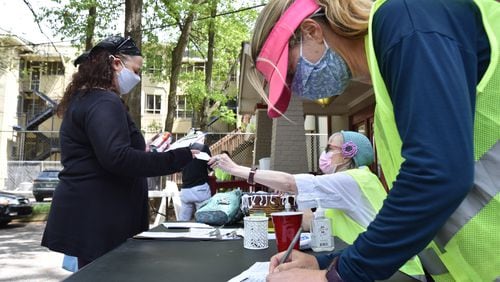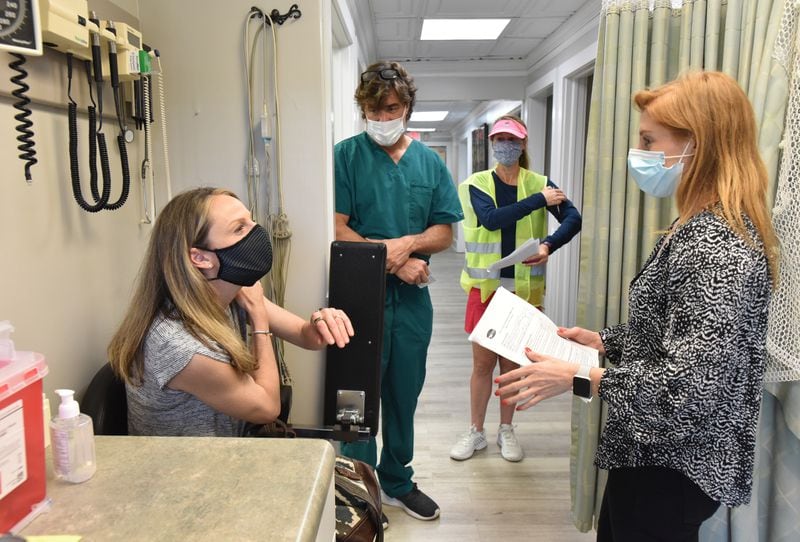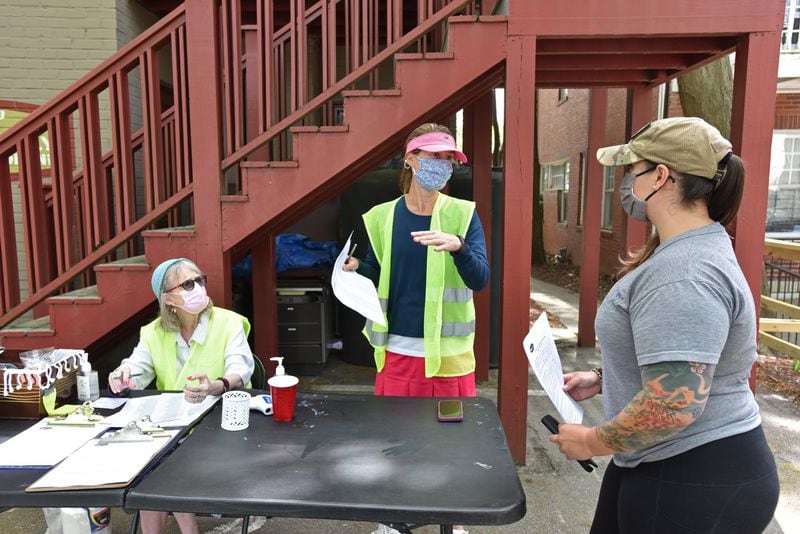A highly infectious variant of the coronavirus that was first identified in Britain is now the most common source of new infections in Georgia, a troubling development that could make the battle ahead to end the pandemic more difficult.
According to surveillance by the Centers for Disease Control from early January through late March, B.1.1.7, a more transmissible and more virulent variant, accounts for at least 46% of all of the state’s cases. That’s double the estimate of a week ago. But it’s likely even far higher.
An analysis focusing on the past few weeks by Helix, a lab testing company, found the B.1.1.7 variant represents closer to 75% of all new cases in Georgia.
“We’ve known it was heading our way and it was just a matter of time,” said Dr. Doug Olson, medical director of the Emergency Department at Northside Hospital Forsyth and resident expert on COVID-19 at Northside.
New coronavirus cases in Georgia have been steadily falling since January, though they are slightly ticking up now. Nervous health officials are watching this closely, wondering if this is the calm before a variant-fueled storm, or if the steady increase of vaccinations and other conditions in Georgia’s favor help the state stave off another COVID-19 surge.
Credit: HYOSUB SHIN / AJC
Credit: HYOSUB SHIN / AJC
Dr. James Steinberg, professor of medicine, Division of Infectious Diseases at Emory University School of Medicine, said he was “fairly concerned” about the widespread presence of the B.1.1.7 variant because of the state’s slow pace of vaccination and the relaxation of mitigation measures.
“I would not be concerned if people were masking, not eating in restaurants and getting vaccinated,” he said.
Georgia is not experiencing a jump in new infections like Michigan, which has the nation’s highest rate of new cases. But experts point out B.1.1.7 took hold of Michigan earlier, and Georgia could be just a few weeks behind.
“I’m concerned Michigan is just ahead on the clock. Human behavior here is not that different here than Michigan,” said Kaiser Permanente of Georgia epidemiologist Dr. Felipe Lobelo, also a former CDC officer. “People are gathering, and people are going to the stadium for an Atlanta United game, and there’s spring break travel. A spike is coming, but no one can predict how big of a spike in cases there will be and how big of spike in hospitalizations there will be.”
But Olson said he is “cautiously optimistic.” While he still expects cases to rise over the coming weeks, he said at the moment, “We are not seeing as many as we thought we would.”
Several factors may account for that. The warmer weather of the state which allows people to enjoy activities outside more safely may help, and it’s likely people in Georgia have more natural immunity from already having had the coronavirus. And Georgia, which expanded vaccine eligibility to everyone 16 and over about three weeks ago, has had time to vaccinate more people before the variant took hold.
“People are gathering, and people are going to the stadium for an Atlanta United game, and there's spring break travel. A spike is coming."
Olson believes the No. 1 factor is vaccinations. He said the number of older COVID-19 patients, including those at nursing homes, has plummeted. He is seeing more patients in their 30s, 40s, and 50s, but he expects that number to decline as more of them get vaccinated.
According to an analysis by The Atlanta Journal-Constitution, the sharpest decline in hospitalizations over the past four weeks was among adults over 60. Children represent less than 3% of hospitalizations, and those under 30 represent about 9%, according to recent data. People over 50 represent about 72% of hospitalizations.
At the moment, most vaccines appear to be effective against the variants. But public health experts are extremely worried that future iterations of the virus could be more resistant to the immune response, requiring Americans to get booster shots or even new vaccines. Variants could also prolong the pandemic.
Encouraging signs
Viruses mutate all the time, and most mutations don’t really matter much. But if the mutations are significant, they can lead to worrisome new variants of the virus. While B.1.1.7, the variant first detected in U.K., is seen as the nation’s biggest threat, the CDC is also tracking other variants, including B.1.351, first found in South Africa, and P.1, which was first identified in Brazil. Together, these variants represent about 2% of new infections in Georgia, according to CDC surveillance estimates.
Lobelo said the B.1.1.7 variant has mutations that can help it bind more easily to cells. One way to think of it, Lobelo said, is the mutation makes the virus “stickier.”
Research suggests the B.1.1.7 variant is both about 60% more contagious and about 60% more deadly than the original version of the coronavirus.
One small study from the U.K. came out this week suggesting the variant was not associated with a higher mortality rate, and while the study is getting a lot of media attention, Steinberg said he didn’t think it was robust enough to change the general consensus that B.1.1.7 is more deadly than the original coronavirus.
In the hospital, it’s hard to tease out any differences between how a variant may be impacting illness versus the original coronavirus. That’s because so many factors, including chronic health conditions, can impact the severity of illness, and it can be hard to predict outcomes even with the original coronavirus.
However, Olson said that in general, COVID-19 patients coming into the emergency room now appear to be less severely ill than during other times during the pandemic.
Steinberg also made the point that while studies show that the death rate from the variant is higher, it still has a low, overall mortality rate. With the estimated death rate of the original coronavirus close to 1%, a virus that is 60% more lethal would raise the death rate to 1.6%, he said.
Another concern is that the variant seems to be hitting younger people, such as adults in their 30s and 40s, harder, and that it may be more of a threat to children.
Dr. Stephen Thacker, director of pediatric infectious diseases at Savannah’s Memorial Health University Medical Center, said more research is needed, but it doesn’t appear the B.1.1.7 variant is more or harmful or severe in children than the first iteration of the coronavirus.
Thacker said the medical center hasn’t admitted a child for a COVID-19 related illness in several weeks.
Statewide, the number of children hospitalized with COVID-19 also remains low. In January and February, about 10 children were hospitalized for COVID-19 on any given day at Children’s Healthcare of Atlanta’s hospitals. The number in recent days is fewer than five children.
Credit: HYOSUB SHIN / AJC
Credit: HYOSUB SHIN / AJC
Dr. Andrea Shane, Children’s director of pediatric infectious diseases, is seeing more mild illnesses among children with MIS-C, a rare inflammatory syndrome that can develop after children are infected with the coronavirus. She said it’s difficult to know, though, if this is due to the variant, greater awareness of MIS-C or other factors that may be at play.
Other numbers are encouraging. Several colleges in Georgia are seeing record low numbers of new infections. At the University of Georgia, March marked the lowest month of cases at UGA since it started doing surveillance last August.
And experts believe any increase we see during the coming weeks won’t be as bad as previous surges. With many people over age 50 at the greatest risk for severe illness and hospitalization having been vaccinated, the total number of coronavirus cases may rise but it may not lead to a jump in complications and hospitalizations.
But now is not the time to relax efforts to control the virus, Thacker said.
“We know a rise is coming,” said Thacker. “We know measures we can take to slow the spread of the virus. For parents, recognize the way I protect my child is to get vaccinated myself. That is what we call ‘cocooning.’ This is not a time to wait and see. ”
Katherine Cadwallader of Atlanta feels a sense of urgency to do her part in the race against the variants. Having had both vaccine shots herself, the 36-year-old has been helping people secure vaccine appointments online. She offers tips on the Georgia Vaccine Hunters Facebook group. She’s offered to give people rides. And she volunteers a few hours every couple of weeks at Highland Urgent Care + Family Medicine’s vaccination clinic, helping people with paperwork and the process of getting vaccinated.
“I think the past year has taught us a lot about who is coming to help us and we can’t just rely on the government or one source,” she said. “I think if we can connect and help each other on a more tight-knit basis, we can move the needle.”
AJC database specialist John Perry contributed to this article
About the Author









